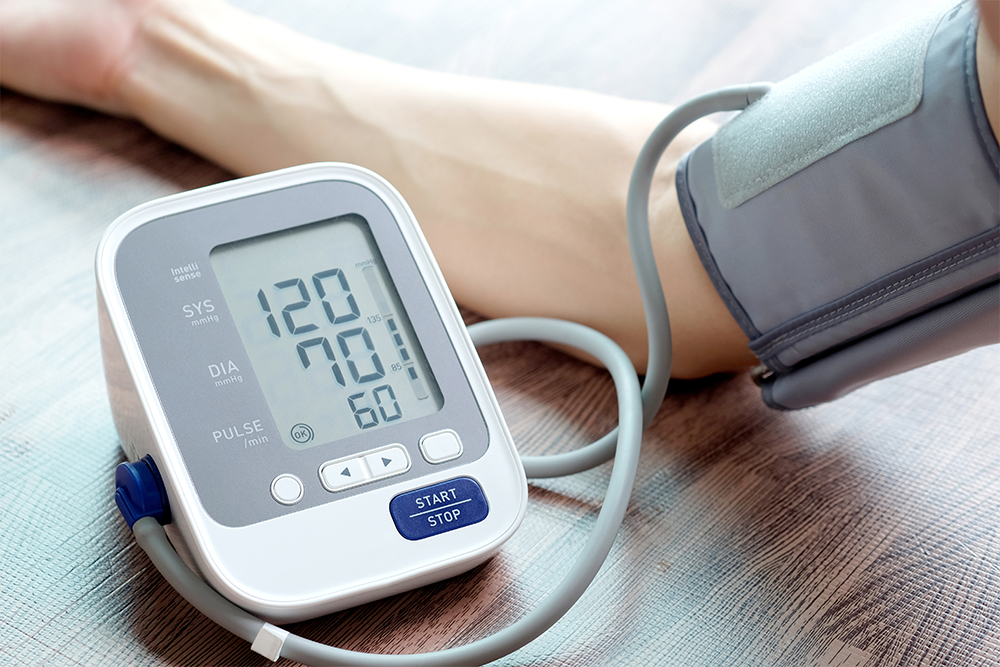
Drugs and alcohol impact a person’s body. The effects a person experiences will be dependent on the substance but typically include a variety of adverse health effects. The severity of the side effects can range from something to worry about to life-threatening. While numerous prescription medications — used as directed — can cause high blood pressure, substance abuse poses this threat as well. Many different drugs and drug withdrawal can spike a person’s blood pressure.
What Is Blood Pressure?
Blood pressure is the result of the effort exerted by your blood moving against the artery walls. Most people are familiar with a blood pressure reading format, for example, 120/80 mm Hg. The first number — systolic — is measured when the heart beats and blood’s pressure against the artery wall is at its highest. The second number — diastolic — is measured between heartbeats when the pressure against the artery wall is lowest.
High blood pressure (hypertension) occurs when your blood pressure exceeds the normal range. It is a condition that occurs when the force of your blood pushing against the arterial walls is higher than average.
The Link Between Substance Abuse and Hypertension
Drugs and alcohol affect the central nervous system, a critical system in the body that relegates vital regulatory systems. These systems are responsible for the things we need to live, including respiration, heart rate and blood pressure.
Drug-induced hypertension may occur when a drug:
- Interferes with medications used to lower blood pressure
- Causes a person to retain higher than average amounts of sodium, or the fluid volumes outside of the cells markedly increase
- Activates the sympathetic nervous system
- Affects the arteriolar smooth muscles
Various risk factors can also put an individual at a heightened risk for hypertension, including:
- Age
- Family history
- Weight gain
- Physical inactivity
- Lack of potassium or vitamin D intake
- High sodium intake
- Stress
Drugs That Cause Blood Pressure Changes
While not all drugs cause blood pressure levels to rise, several commonly used substances pose this risk. The following drugs have been linked to concerns of high blood pressure:
- Alcohol: Hypertension is associated with chronic alcohol use and binge drinking. Withdrawal from alcohol may also cause changes in blood pressure.
- Amphetamines: Hypertension is prevalent with individuals who use amphetamines, with stroke being the most significant concern.
- Cannabinoids: Cannabinoids, including marijuana and hashish, can cause hypertension when smoked. This is a particular danger for those already experiencing cardiovascular concerns.
- Cocaine: Hypertension is common among people who use cocaine but may be reduced if other side effects attributable to cocaine are decreased.
- PCP: PCP is linked to a decrease of two neurotransmitters, epinephrine and norepinephrine, which then intensify sympathetic nervous system functioning.
- Methylated amphetamines: Often referred to as designer drugs, such as Ecstasy, these hallucinogens may create a hypertensive crisis, a potentially life-threatening condition that occurs when blood pressure spikes rapidly to critical levels.
Withdrawal from certain drugs which do not usually pose a threat of hypertension during use, such as opiates, can also cause hypertension.
The Risks of Hypertension
Hypertension can be deadly. In instances of drug abuse, it may be temporary, or in situations of chronic abuse, prolonged. If untreated and uncontrolled, hypertension may cause:
- Aneurysm: High blood pressure may diminish the strength of blood vessels, causing them to bulge. If an aneurysm ruptures, a person’s life may be jeopardized.
- Cognitive difficulties: A person may have difficulty learning, retaining or accessing information and struggle to think or understand things.
- Heart attack: Prolonged high blood pressure can cause the arteries to thicken and harden, referred to as atherosclerosis. This, in turn, may cause a heart attack.
- Heart failure: As blood pressure rises, your heart has to contend with this increased resistance and thickens to pump the blood, which may eventually cause the heart to struggle. This results in insufficient amounts of blood reaching your body.
- Stroke: High blood pressure is the number one cause of stroke and is caused by the same complications as a heart attack and a ruptured vessel near or within the brain due to high blood pressure.
Substance Addiction Treatment
Often, substance addiction is linked to mental health disorders like anxiety or depression. When your social network or job throws you curveballs, these feelings can increase. You can turn to substances to help you “get over” anxiety or depression. Substance addiction treatment can help you identify your triggers and guide you in discovering healthy coping skills. A treatment center that offers therapy focused on your anxiety, depression or substance use provides you with the care you need based on your mental health disorder or substance of choice.
Once you address your mental health or substance addiction, you can learn how to include healthy habits into your daily routine. These habits can increase your well-being because they can decrease your blood pressure and risk of hypertension, a heart attack or stroke.
Drugs and alcohol impact the body. Sometimes, this impact can lead to high blood pressure, also known as hypertension. Fortunately, you can improve these conditions by embracing healthy lifestyle changes and addressing your dependence on alcohol or drugs. Casa Palmera’s substance and mental health treatment programs focus on your unique needs with a holistic approach that supports you throughout your recovery journey. We welcome your inquiries and look forward to speaking with you about how we can guide you through your mental health or substance use treatment. Call (855) 508-0473 to speak to one of our caring and experienced professionals about getting started on your journey to a healthier, more fulfilling life.




